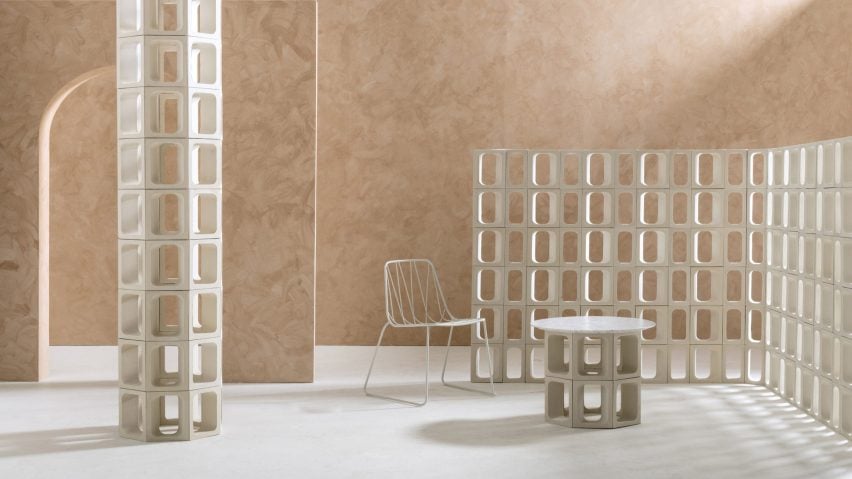Australian designer Tom Fereday has developed a faceted cement breeze block that can be flipped over and combined in various ways to create angled surfaces.
Sydney-based Fereday created the Omni building tool in a bid to "reinvent the traditional breeze block for the modern-day environment".
Omni's angular profile comprises a wider front and narrower rear surface, which are joined at a 45-degree angle and enclose a rounded central void.
When the blocks are laid alternately with the front and rear surface aligned they can be used to create straight walls.
They can also be combined with the front edges touching to create kinked or L-shaped surfaces.
"By considering and experimenting with the traditional form of the breeze block we were able to entirely re-imagine the product and its potential application," said Fereday.
In addition to conventional straight or right-angled walls, the block's design enables the creation of columns or elements with alternative applications, such as supports for various types of tables.
"By addressing the potential for the possibility of new applications other than simple straight feature walls, the Omni block entirely re-invents the category, opening up opportunities for designers to interpret its use for both indoor and outdoor applications," the designer added.
The breeze block was designed in collaboration with Australian firm Earp Brothers, which supplies builders, architects and homeowners with tiles and other surface materials.
It features on the shortlist for the Product design category of the Dezeen Awards 2019, alongside a household hydroponics device and a self-cleaning reusable water bottle.
Suited for internal or external use, Omni is manufactured from dry-pressed cement, which does not require firing or other high-energy processes.
The breeze blocks are available in white, black and off-white colourways.
Fereday studied at Wimbledon School of Art in England before completing an honours degree in Industrial Design at the University of Technology Sydney.
His design approach celebrates the materials and manufacturing processes used to create products, and has previously been applied to a lamp shade made from a single coil of extruded ceramic and a minimal chair based on industrial factory seating.
Fereday previously made a light from a single coil of extruded ceramic, which takes two and a half hours to 3D print. The light is made up of a conical shade with minute furrows that are formed as the clay is coiled on top of itself.

